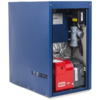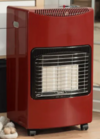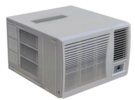- Joined
- 27 Jan 2008
- Messages
- 28,071
- Reaction score
- 3,407
- Location
- Llanfair Caereinion, Nr Welshpool
- Country

In caravans and boats you can have gas or oil fired heaters which can be cheaper to run, much depends on the quantity of oil or gas bought. The small dumpy cylinders of gas work out expensive, but the larger ones are harder to move around, I looked at the one on my sons boat, looked some thing like this
 and my thoughts were why don't we use them in houses, it is so compact, well it seems they are not efficient enough, building regulations say central heating boilers must be to a set efficiency, and these do not comply, so we jump to a massive unit like this
and my thoughts were why don't we use them in houses, it is so compact, well it seems they are not efficient enough, building regulations say central heating boilers must be to a set efficiency, and these do not comply, so we jump to a massive unit like this  so we are looking at a compromise size v efficiency and how to heat the home at a reasonable cost both installation cost and running cost, and in the main it depends on the size of room to be heated and the time it is heated for.
so we are looking at a compromise size v efficiency and how to heat the home at a reasonable cost both installation cost and running cost, and in the main it depends on the size of room to be heated and the time it is heated for.
If the room is only the size of a caravan and your only wanting it heated for a few hours, then the cost of having a heat pump, or oil boilers is likely not cost effective.
The stand alone heater has a big problem, oil or gas are hydro-carbon fuels, and when they burn they make water, so as I found out living in a caravan a heater with no flue makes the caravan damp, and a heater which draws combustion air from inside the living quarters produces drafts. Including the old coal fire.
has a big problem, oil or gas are hydro-carbon fuels, and when they burn they make water, so as I found out living in a caravan a heater with no flue makes the caravan damp, and a heater which draws combustion air from inside the living quarters produces drafts. Including the old coal fire.
So the main thing is some where some how you need a flue, and better if a balanced flue, so what can be fitted depends on what can be routed outside.
I have lived where the standard AC looked like this they seemed to fit in a standard box which hung outside, and would both heat and cool, however be it my own or my neighbours, the AC cutting in and out was a noisy thing, and although I did get use to them, it would likely not be liked by your neighbours.
they seemed to fit in a standard box which hung outside, and would both heat and cool, however be it my own or my neighbours, the AC cutting in and out was a noisy thing, and although I did get use to them, it would likely not be liked by your neighbours.
As with all refrigeration units, there are good and bad, and with inverter motors the noise can be reduced, and even the central heating boiler makes some noise, and it does depend where you live, at the side of a busy main road, the sound of a heat pump is nothing, but on a sleepy back water, the noise is a problem, I know those boat heaters made some noise and trying to sleep next to a boat in a marina with one of them running was not the best. looking at the advert nothing about DB or noise produced, mind you neither did the units designed for houses this brochure shows all sorts from oil to pellets to heat pumps, and non seem to say how much noise.
made some noise and trying to sleep next to a boat in a marina with one of them running was not the best. looking at the advert nothing about DB or noise produced, mind you neither did the units designed for houses this brochure shows all sorts from oil to pellets to heat pumps, and non seem to say how much noise.
 and my thoughts were why don't we use them in houses, it is so compact, well it seems they are not efficient enough, building regulations say central heating boilers must be to a set efficiency, and these do not comply, so we jump to a massive unit like this
and my thoughts were why don't we use them in houses, it is so compact, well it seems they are not efficient enough, building regulations say central heating boilers must be to a set efficiency, and these do not comply, so we jump to a massive unit like this  so we are looking at a compromise size v efficiency and how to heat the home at a reasonable cost both installation cost and running cost, and in the main it depends on the size of room to be heated and the time it is heated for.
so we are looking at a compromise size v efficiency and how to heat the home at a reasonable cost both installation cost and running cost, and in the main it depends on the size of room to be heated and the time it is heated for.If the room is only the size of a caravan and your only wanting it heated for a few hours, then the cost of having a heat pump, or oil boilers is likely not cost effective.
The stand alone heater
 has a big problem, oil or gas are hydro-carbon fuels, and when they burn they make water, so as I found out living in a caravan a heater with no flue makes the caravan damp, and a heater which draws combustion air from inside the living quarters produces drafts. Including the old coal fire.
has a big problem, oil or gas are hydro-carbon fuels, and when they burn they make water, so as I found out living in a caravan a heater with no flue makes the caravan damp, and a heater which draws combustion air from inside the living quarters produces drafts. Including the old coal fire.So the main thing is some where some how you need a flue, and better if a balanced flue, so what can be fitted depends on what can be routed outside.
I have lived where the standard AC looked like this
 they seemed to fit in a standard box which hung outside, and would both heat and cool, however be it my own or my neighbours, the AC cutting in and out was a noisy thing, and although I did get use to them, it would likely not be liked by your neighbours.
they seemed to fit in a standard box which hung outside, and would both heat and cool, however be it my own or my neighbours, the AC cutting in and out was a noisy thing, and although I did get use to them, it would likely not be liked by your neighbours.As with all refrigeration units, there are good and bad, and with inverter motors the noise can be reduced, and even the central heating boiler makes some noise, and it does depend where you live, at the side of a busy main road, the sound of a heat pump is nothing, but on a sleepy back water, the noise is a problem, I know those boat heaters
 made some noise and trying to sleep next to a boat in a marina with one of them running was not the best. looking at the advert nothing about DB or noise produced, mind you neither did the units designed for houses this brochure shows all sorts from oil to pellets to heat pumps, and non seem to say how much noise.
made some noise and trying to sleep next to a boat in a marina with one of them running was not the best. looking at the advert nothing about DB or noise produced, mind you neither did the units designed for houses this brochure shows all sorts from oil to pellets to heat pumps, and non seem to say how much noise.

